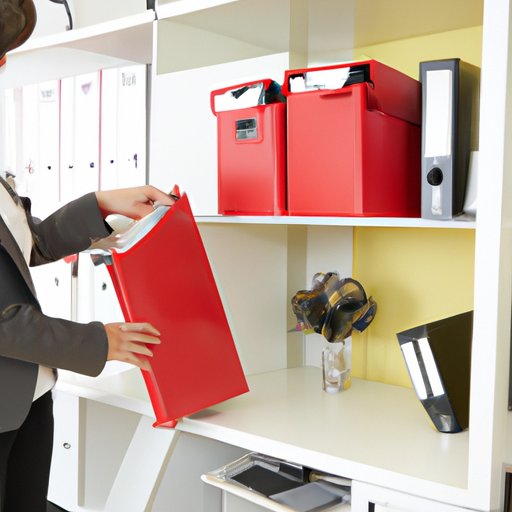Introduction
Professional organizing is a specialized occupation that involves helping individuals and businesses create efficient, organized systems for managing their space, time, and other resources. Professional organizers can help clients declutter and organize their homes, offices, or any other space. They can also provide advice on organizing documents, scheduling tasks, and creating strategies for managing everyday life.
Organizing can make a huge difference in one’s quality of life. By streamlining the process of finding things, organizing can help save time and reduce stress. Professional organizers can offer invaluable assistance to those who are overwhelmed by clutter and disorganization.

Necessary Skills for Professional Organizers
To become a professional organizer, certain skills are necessary. These include excellent communication and interpersonal skills, problem-solving abilities, and the ability to think outside the box. Professional organizers must also be able to stay focused and motivated, even when dealing with challenging clients.
Organizers should have strong organizational skills and be detail-oriented. They should also possess good time management skills and be comfortable working independently. Above all, they should be patient and understanding with their clients.
Setting Up an Efficient Workspace
Professional organizers should have a designated workspace that is both efficient and comfortable. The workspace should be free of distractions, such as TVs or phones. It should also be well-lit and organized. Utilizing storage solutions, like baskets and shelves, can help keep the workspace tidy and organized.
Having the right tools and supplies on hand is essential for any professional organizer. These may include pens, paper, filing systems, labels, computer programs, and more. Professional organizers should also invest in ergonomic furniture and equipment to ensure that their workspace is comfortable and conducive to productivity.
Utilizing Available Resources
Professional organizers should take advantage of all available resources. This includes books and articles on organizing, online courses and tutorials, and networking opportunities. It can also be helpful to join local or national groups related to professional organizing.
Attending conferences and seminars can also be beneficial. These events provide great opportunities to learn from experienced professionals, network with colleagues, and find new clients.

Different Types of Professional Organizing Services
There are many different types of professional organizing services. Some organizers specialize in home organization, while others focus on office organization. Other services include document management, time management, and project management.
Organizers may also offer virtual services, such as creating digital filing systems and providing advice via email or video chat. Some organizers even offer on-site services, where they will physically come to the client’s home or office and offer personalized organizing advice.
Essential Tools and Supplies for Professional Organizers
Professional organizers need to have the right tools and supplies to do their job effectively. These may include storage solutions, such as bins, shelving, and drawers; labeling systems, such as stickers and markers; and software programs, such as task trackers and calendar apps.
Organizers may also need to purchase cleaning supplies and tools, such as vacuums and dusters, to properly clean and maintain the client’s space. Additionally, organizers should invest in high-quality materials, such as folders and binders, to ensure that their work is professional and long-lasting.

Building a Client Base and Networking
Successful professional organizers understand the importance of building a client base and networking. Networking can involve attending industry events, joining online groups, and connecting with other professionals. It can also involve utilizing social media platforms to promote services and connect with potential clients.
Organizers should also consider creating a website or blog to showcase their work and attract new clients. Additionally, they should strive to provide exceptional customer service and build relationships with existing clients.
Conclusion
Being a professional organizer requires a variety of skills, resources, and tools. To succeed, organizers must have excellent communication and interpersonal skills, be detail-oriented, and be willing to invest in the necessary tools and supplies. Additionally, they must be comfortable setting up an efficient workspace and utilizing available resources. Finally, they must be willing to build a client base and network with other professionals.
(Note: Is this article not meeting your expectations? Do you have knowledge or insights to share? Unlock new opportunities and expand your reach by joining our authors team. Click Registration to join us and share your expertise with our readers.)
